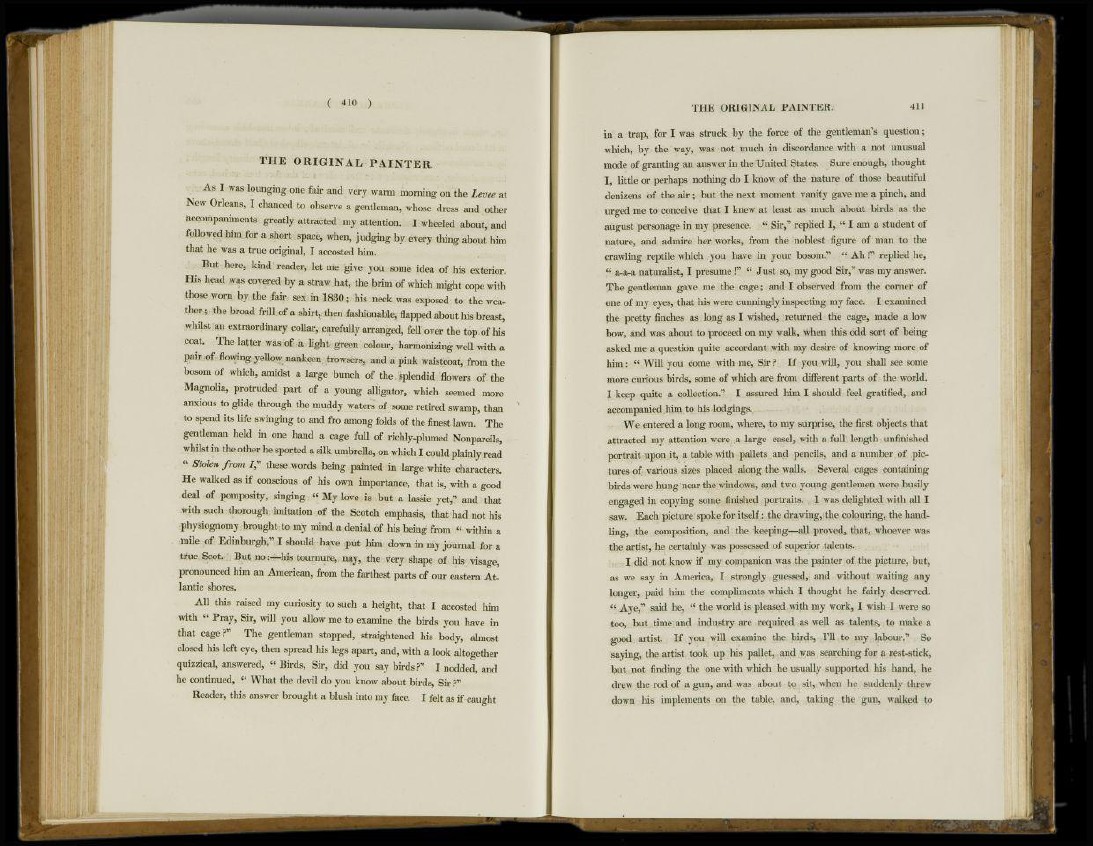
( 410 )
THE O R I G I N A L PAINTER.
As I was lounging one fair and very warm morning on the Levee at
New Orleans, I chanced to observe a gentleman, whose dress and other
accompaniments greatly attracted my attention. I wheeled about, and
followed him for a short space, when, judging by every thing about him
that he was a true original, I accosted him.
But here, kind reader, let me give you some idea of his exterior.
His head was covered by a straw hat, the brim of which might cope with
those worn by the fair sex in 1.830; his neck was exposed to the weather
; the broad frill of a shirt, then fashionable, napped about his breast,
whilst an extraordinary collar, carefully arranged, fell over the top of his
coat. The latter was of a light green colour, harmonizing well with a
pair of flowing yellow nankeen trowsers, and a pink waistcoat, from the
bosom of which, amidst a large bunch of the splendid flowers of the
Magnolia, protruded part of a young alligator, which seemed more
anxious to glide through the muddy waters of some retired swamp, than
to spend its life swinging to and fro among folds of the finest lawn. The
gentleman held in one hand a cage full of richly-plumed Nonpareils,
whilst in the other he sported a silk umbrella, on which I could plainly read
" Stolen from ƒ," these words being painted in large white characters.
He walked as if conscious of his own importance, that is, with a good
deal of pomposity, singing " My love is but a lassie yet,1' and that
with such thorough imitation of the Scotch emphasis, that had not his
physiognomy brought to my mind a denial of his being from " within a
mile of Edinburgh," I should have put him down in my journal for a
true Scot. But no:—his tournure, nay, the very shape of his visage,
pronounced him an American, from the farthest parts of our eastern Atlantic
shores.
All this raised my curiosity to such a height, that I accosted him
with " Pray, Sir, will you allow me to examine the birds you have in
that cage ?" The gentleman stopped, straightened his body, almost
closed his left eye, then spread his legs apart, and, with a look altogether
quizzical, answered, " Birds, Sir, did you say birds ?" I nodded, and
he continued, c* What the devil do you know about birds, Sir ?"
Reader, this answer brought a blush into my face. I felt as if-caught
THE ORIGINAL PAINTER. 411
in a trap, for I was struck by the force of the gentleman's question;
which, by the way, was not much in discordance with a not unusual
mode of granting an answer in the United States. Sure enough, thought
I, little or perhaps nothing do I know of the nature of those beautiful
denizens of the air; but the next moment vanity gave me a pinch, and
urged me to conceive that I knew at least as much about birds as the
august personage in my presence. " Sir," replied I, " I am a student of
nature, and admire her works, from the noblest figure of man to the
crawling reptile which you have in your bosom." " Ah!" replied he,
" a-a-a naturalist, I presume !" " Just so, my good Sir," was my answer.
The gentleman gave me the cage; and I observed from the corner of
one of my eyes, that Ins were cunningly inspecting my face. I examined
the pretty finches as long as I wished, returned the cage, made a low
bow, and was about to proceed on my walk, when this odd sort of being
asked me a question quite accordant with my desire of knowing more of
him : " Will you come with me, Sir ? If you will, you shall see some
more curious birds, some of which are from different parts of the world.
I keep quite a collection." I assured him I should feel gratified, and
accompanied him to his lodgings.
We entered a long room, where, to my surprise, the first objects that
attracted my attention were a large easel, with a full length unfinished
portrait upon it, a table with pallets and pencils, and a number of pictures
of various sizes placed along the walls. Several cages containing
birds were hung near the windows, and two young gentlemen were busily
engaged in copying some finished portraits. I was delighted with all I
saw. Each picture spoke for itself: the drawing, the colouring, the handling,
the composition, and the keeping—all proved, that, whoever was
the artist, he certainly was possessed of superior talents.
I did not know if my companion was the painter of the picture, but,
as we say in America, I strongly guessed, and without waiting any
longer, paid him the compliments which I thought he fairly deserved.
" Aye," said he, " the world is pleased with my work, I wish I were so
too, but time and industry are required as well as talents, to make a
good artist. If you will examine the birds, I'll to my labour." So
saying, the artist took up his pallet, and was searching for a rest-stick,
but not finding the one with which he usually supported his hand, he
drew the rod of a gun, and was about to sit, when he suddenly threw
down his implements on the table, and, taking the gun, walked to